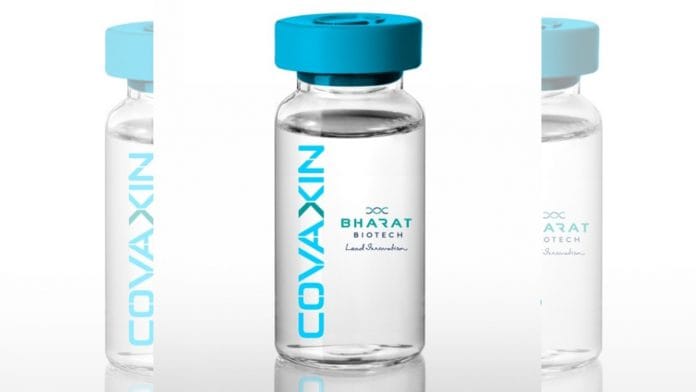New Delhi: Hyderabad-based Bharat Biotech may add another arm to its ongoing clinical trial of indigenous Covid-19 vaccine Covaxin, where volunteers will be administered the vaccination through a different method.
The company is working on the Covid-19 vaccine project along with the country’s top health research body, the Indian Council of Medical Research (ICMR).
Bharat Biotech is already running a clinical trial at 12 selected sites across the country where “healthy volunteers” have been administered vaccination shots directly into the muscles.
In its latest proposal, Bharat Biotech intends to conduct trials using “intradermal (ID) vaccine delivery route”, which has been approved by the Subject Expert Committee (SEC), a body under the Central Drugs Standard Control Organisation (CDSCO). The CDSCO is a health ministry arm that regulates the quality of drugs and vaccines in the country.
Under the ID route, the vaccine shot is given in the dermis, one of the layers of the skin. The shot is less invasive, requires lesser dosage and sometimes, helps the vaccine show better immune response.
“The firm presented their proposal for conduct of phase I/II clinical trial of CoronaVirus Vaccine by intradermal (ID) route. The firm also presented their animal toxicity data generated through intradermal route and interim safety data from phase I study through intramuscular route,” said the minutes of a 13 August meeting which have been uploaded on the website of the CDSCO.
“After detailed deliberation, the committee recommended for grant of permission to conduct the phase I/II clinical trial through ID route,” the SEC noted while adding two conditions to the approval.
The conditions are that participants should be “followed up for six months” where they will be checked on how much antibodies against Covid-19 have been produced, apart from checking their general body parameters.
The SEC has also asked that clinical trial sites of this study “should be different from the sites of the intramuscular study”.
The SEC, however, only advises CDSCO’s head, the Drug Controller General of India (DCGI), on applications seeking approvals for new drugs, vaccines, and clinical trials for Covid-19. The final call on the proposals will be taken by DCGI V.G. Somani.
Also read: Bharat Biotech — India’s Covid vaccine hope first shot to fame for $1 rotavirus vaccine
Intradermal vaccine delivery
According to the World Health Organization (WHO), there has been a renewed interest in intradermal vaccine delivery.
The interest is driven by the fact that “the dermis and epidermis of human skin are rich in antigen-presenting cells”, suggesting that delivery of vaccines to these layers, rather than to muscle or subcutaneous tissue, should be more efficient and induce protective immune responses with smaller amounts of vaccine antigen.
So far, most vaccines have been delivered by the muscular routes or through the fat layer, underneath the skin. The ID route vaccine delivery is generally used for the administration of selected vaccinations, such as Bacille Calmette-Guérin (BCG) and rabies.
ID delivery could decrease cost vaccine shot
The main advantage of ID vaccine administration is that smaller amounts of vaccines are needed as compared to intramuscular routes, health experts said.
“This method could help in dose-sparing. So you could potentially increase the number of people you are able to vaccinate with the same amount of vaccine. This can also decrease the per injection cost, which is relevant from a public health perspective,” said Anant Bhan, a researcher in global health, bioethics and health policy and former president of International Association of Bioethics.
“However, clinical trials are needed to evaluate and compare if the intradermal administration performs comparably in eliciting an immune response which is protective in nature as an intramuscular route administration.”
Dr P.K. Tyagi, an expert in community medicine, echoed similar observations.
“The company might be testing the efficacy (through this route) as ID requires less dosage. Also, the cost to the company will go down if immunogenicity (ability to induce an immune response) attained is comparable or better against the intramuscular route,” Dr Tyagi said.
Also read: ‘Taskmaster, skilled administrator, impulsive’ — ICMR’s Bhargava who wanted vaccine by 15 Aug







This method, if successful, will hopefully prove cheaper and more effective.